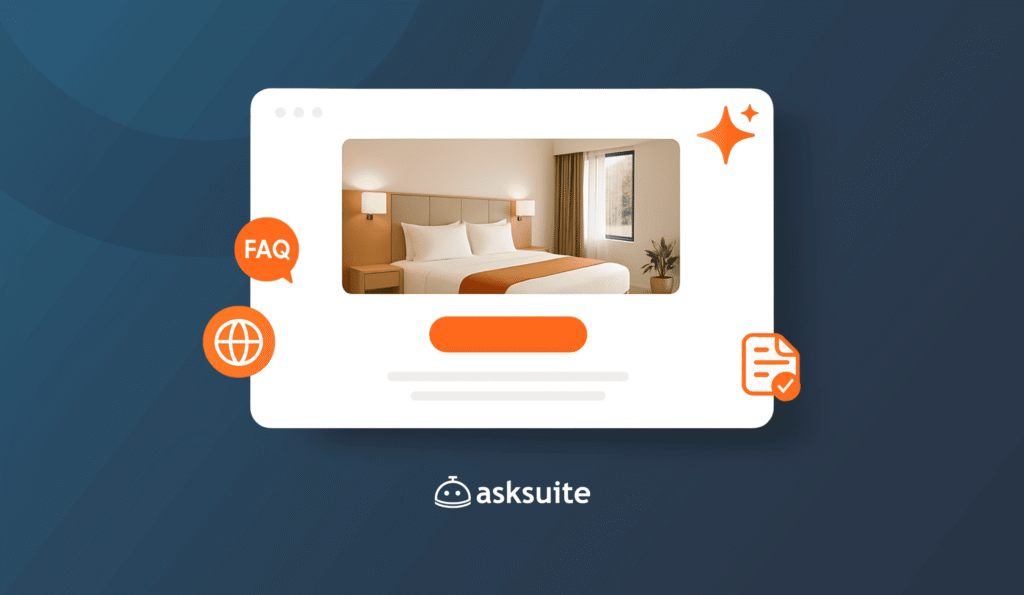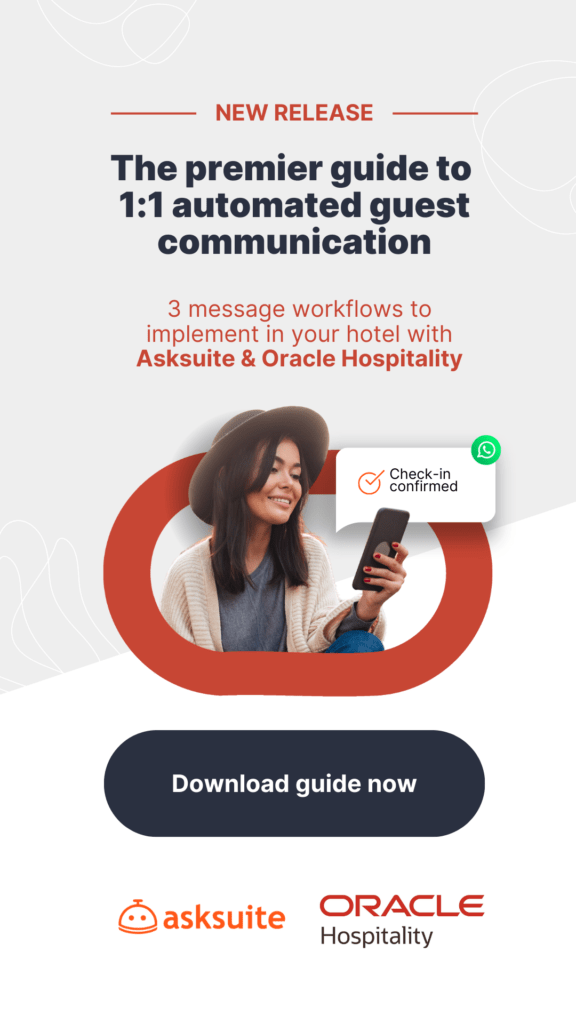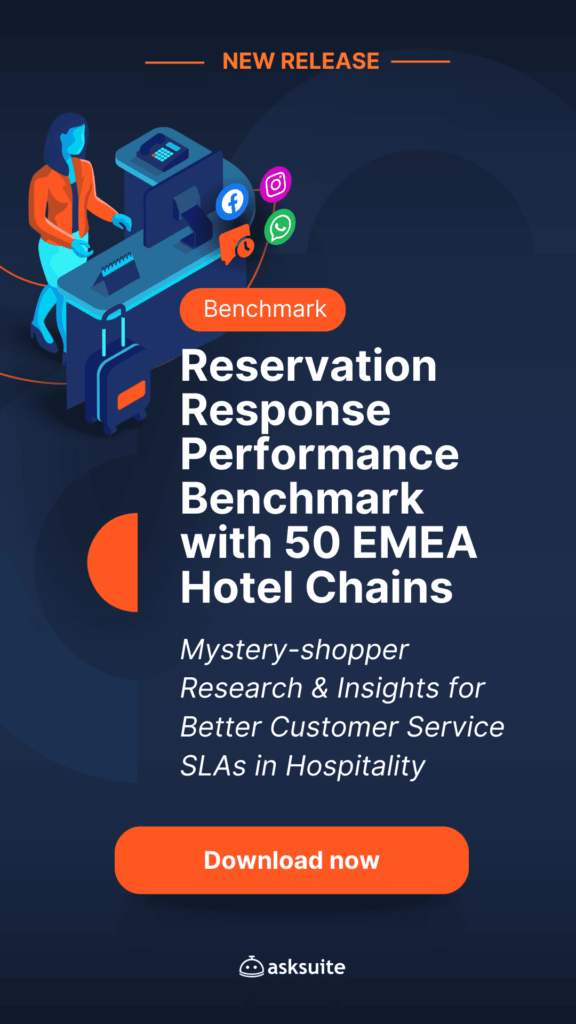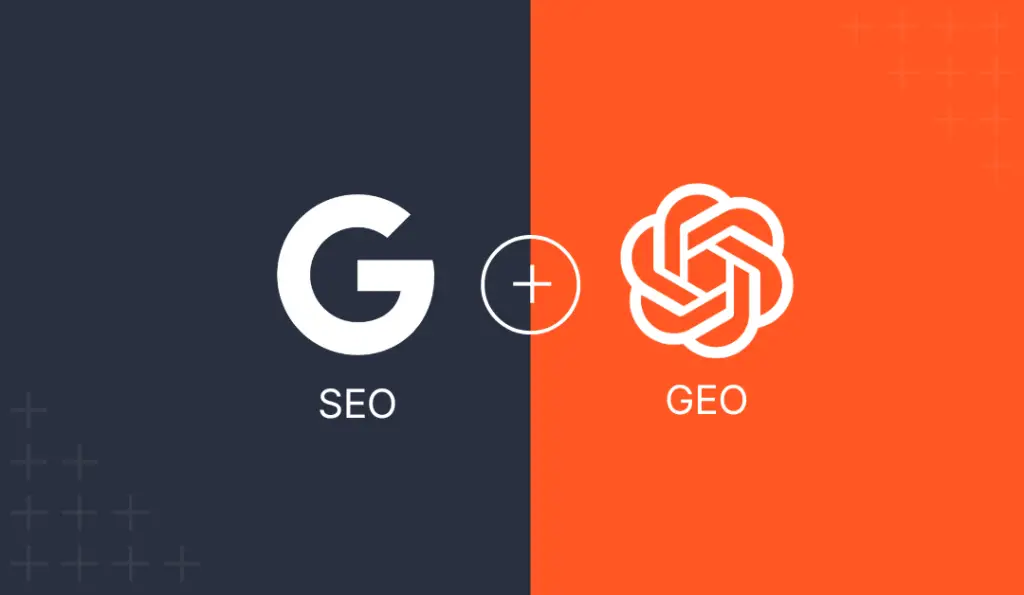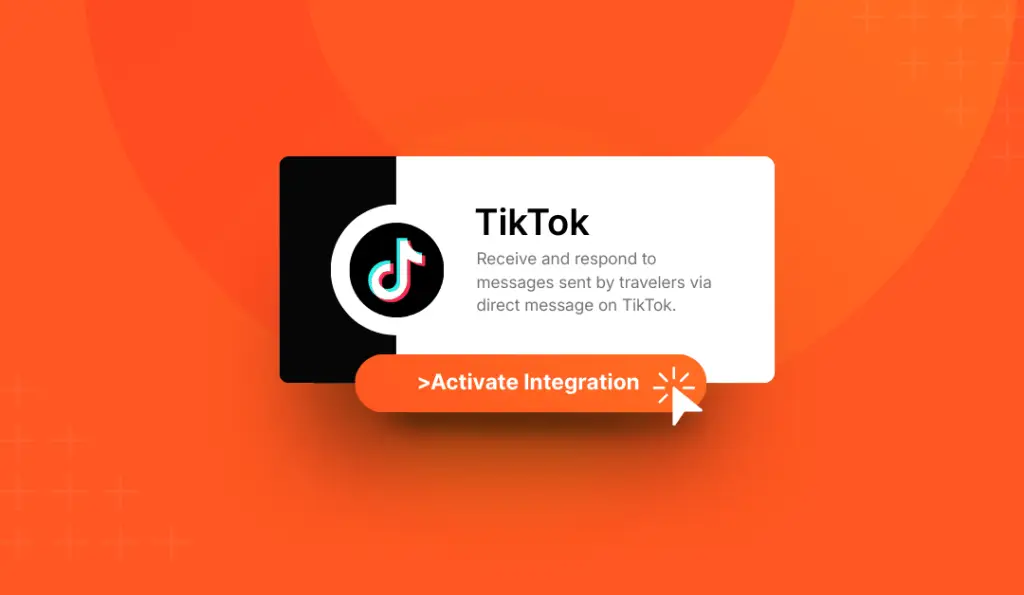How to prepare your hotel website for AI-powered discovery and protect your direct bookings in the new era of conversational search.
AI tools like ChatGPT, Gemini, Perplexity, and Claude are rapidly changing how travelers research and compare hotels. Instead of browsing endless pages of search results, they’re asking natural-language questions like, “What’s a romantic hotel near the Eiffel Tower with spa services and late check-out?” and getting direct answers.
If your property’s content isn’t reader-friendly, trustworthy, and specific enough for these large language models (LLMs), it simply won’t be recommended. That means fewer direct bookings and more dependence on OTAs.
The average traveler views 141 pages of content before booking, according to Eviivo. LLMs can shrink that journey to a single AI-generated shortlist. And hotels from all over the world are already seeing a spike in referral traffic from ChatGPT.
The time to adapt is now. This guide will show you exactly how to make your hotel website visible, reliable, and LLM-ready, before your competitors do.
What does “optimize for LLM” mean? (Spoiler: It’s not traditional SEO)
If you’re still thinking in terms of keyword density and meta tags, it’s time to shift your mindset.
Optimizing your hotel website for LLMs means creating content that AI models can easily interpret, trust, and use to guide travelers through conversational search. Instead of scanning a list of search results, travelers are asking specific questions like:
- “Best boutique hotel near Central Park with parking and vegan breakfast”
- “Hotels in London with rooftop pools and late check-out”
LLMs like ChatGPT, Gemini, Perplexity, and Claude analyze huge volumes of online content to generate answers to these types of queries. But they don’t just look for keyword matches, they prioritize clarity, structure, trustworthiness, and detail.
That means a new content strategy: rather than simply targeting “London hotel + breakfast,” your site needs in-depth answers to real travelers’ questions, using clear formatting, natural language, and structured data.
The goal is to make your website not just visible, but quotable. Something the AI trusts enough to pull directly into its response. And that requires a fundamentally different approach than traditional SEO.
10 actionable strategies to prepare your website for AI search
These 10 strategies are designed to make your website LLM-friendly, so when a guest asks ChatGPT, “What’s a family-friendly hotel in Rome with parking and a heated pool?”, your website is part of the answer.
Let’s break it down:
1. Implement comprehensive FAQ sections (on all pages)
Travelers are turning to AI with specific, conversational questions, just like they would ask a front desk agent. Questions like:
- “What time is check-in at this hotel?”
- “Does the Deluxe Suite have a bathtub and a balcony?”
- “ Is downtown within walking distance from the hotel?”
To show up in these AI-generated answers, your website needs to make those details easy for language models to find and understand.
Add FAQ sections in Q&A format throughout your website, not just on a dedicated FAQ page. Include relevant questions on:
- The homepage (general info and booking policies)
- Room pages (features, views, upgrade options)
- Amenity pages (hours, pricing, accessibility)
- Location/contact pages (directions, parking, transit tips)
LLMs love Q&A formatting because it mirrors how users phrase their queries. When done well, these sections become a reliable source that AI can pull from directly, giving your hotel a better chance of being mentioned in a traveler’s results.
2. Add maximum structured data (Schema.org)
LLMs rely heavily on structured data to verify facts, interpret context, and understand the entities behind a webpage. For hotels, using Schema.org markup is one of the most powerful ways to make your content AI-readable.
Start by implementing these key schema types:
- Hotel: Include full details, such as name, address, star rating, amenities, and accepted payment methods.
- FAQ: Mark up every FAQ section on your site using the correct question-and-answer format.
- Review: Showcase testimonials and ratings with structured metadata.
- LocalBusiness: Add contact info, hours of operation, and geolocation data.
Structured data is essentially a language AI can rely on, turning your website from a “guessable” source into a trustworthy one. When LLMs find schema-rich pages, they can extract and summarize your content more accurately, which increases the chance of being recommended or linked in a response.
3. Create rich, hyper-detailed content (Be specific)
Vague content doesn’t help AI, or travelers, make decisions. Phrases like “modern rooms” or “great location” are too generic for LLMs to interpret confidently. Instead, focus on content that’s literal, specific, and packed with real-world detail.
Here’s how to upgrade your content:
- Write 150–300 word descriptions for each room type:
Don’t say: “All rooms feature modern amenities.”
Say: “Each room includes a Nespresso machine, USB charging ports by the bed, blackout curtains, and a rainfall shower.”
- Create area guides that cover what’s within a 5-minute walk or drive: restaurants, museums, beaches, metro stops.
- Describe views, lighting, room size, and anything guests often ask about in emails or phone calls.
LLMs use these specifics to determine if your property meets the traveler’s needs. The more complete your content, the more confidently an AI can recommend your hotel in response to a highly detailed question.
4. Be transparent about policies and pricing
Travelers rely on AI to provide precise and trustworthy answers, especially when it comes to policies and pricing. If your hotel’s policies are unclear or buried in fine print, you risk losing both AI recommendations and travelers’ trust.
What to do:
- Create dedicated pages for your hotel’s key policies:
- Cancellation policies
- Pet policies
- Accessibility options
- Extra fees (e.g., resort fees, parking, cleaning charges)
Ensure these pages are easy to find from the homepage, booking engine, and room details. Be upfront about all charges, with no hidden fees, to avoid any friction in the traveler’s decision-making process.
LLMs prioritize transparency, rewarding clear, concise, and accessible information. When a traveler asks specific policy-related questions, AI will favor websites that are straightforward and thorough, leading to better recommendations and higher potential guest confidence.
5. Optimize your multimedia (Images and videos)
Multimedia elements like images and videos play a key role in how travelers experience your hotel online. But LLMs and AI models can’t “see” these elements the way humans do. To ensure they’re properly understood and indexed, you need to optimize them with descriptive text.
What to do:
- Use descriptive alt text for every image: For example, instead of “IMG_12345,” write: “Ocean-view balcony from the Deluxe Suite at [Hotel Name].”
- For video content, provide transcripts or detailed captions. This helps AI models fully understand the video’s context, allowing them to better assess its relevance to traveler queries.
LLMs like ChatGPT now work with multimodal AI models, meaning they can analyze both text and visual content. By adding text descriptions, you’re providing the necessary context for AI to interpret images and videos accurately, which can lead to your property being recommended for more specific, image-based searches.
6. Ensure local listing consistency (NAP)
LLMs and AI models rely on local business data to verify the legitimacy and trustworthiness of a hotel. Inconsistent or incomplete listings across platforms can confuse AI systems, making it harder for them to recommend your hotel.
What to do:
- Fully complete your Google Business Profile and Bing Places listings, ensuring all fields are filled out (e.g., business hours, photos, amenities).
- Ensure consistency in your Name, Address, Phone number (NAP) across all platforms, including OTAs, review sites, and social media.
- Respond to reviews (both positive and negative) on all platforms to maintain a healthy reputation.
LLMs cross-reference local business data from various sources to build a complete profile of your hotel. Consistency in NAP information and active engagement with reviews helps establish authority and trust, increasing the likelihood that your hotel will be recommended in AI-generated search results.
7. Optimize for real-time bookability
In the AI-driven search landscape, travelers want to make decisions quickly, and LLMs prioritize websites where the booking process is seamless and transparent.
What to do:
- Ensure your website features an integrated booking engine that reflects real-time availability and pricing.
- Display clear “Book Now” CTAs on all room and property pages, making it easy for travelers to take immediate action.
- Guarantee the booking process is smooth across all devices, especially mobile.
LLMs favor properties that allow users to easily complete their booking journey directly from the website. If a traveler can find accurate availability and pricing and secure their reservation effortlessly, AI models are more likely to recommend your hotel as a relevant option.
8. Demonstrate content freshness
AI models tend to prioritize content that is regularly updated. Websites with stale, outdated information can be penalized in AI recommendations, as LLMs favor fresh, current content that reflects the latest details.
What to do:
- Maintain a blog or news section with monthly updates about local events, seasonal packages, promotions, and any new hotel offerings.
- Clearly mark updated pages with a date (e.g., “Updated October 2025”) to show AI models that your content is regularly refreshed.
LLMs tend to prioritize content that demonstrates recency and relevance. When your site is regularly updated, it signals to AI that your hotel is actively engaging with current trends, which can improve your visibility in search results and boost your chances of being recommended.
9. Rethink SEO for conversational queries
As LLMs become the go-to search tool, they rely on natural language queries rather than traditional keyword-based searches. To ensure your site shows up in these AI-driven responses, you need to focus on long-tail, conversational queries that mirror how travelers actually ask questions.
What to do:
- Use tools like AnswerThePublic and Google’s “People Also Ask” to identify real questions travelers are asking AI.
- Optimize your content around these conversational, long-tail queries, ensuring you’re answering them in a natural, user-friendly manner.
LLMs thrive on natural language processing, they understand and respond to full sentences or questions, not just isolated keywords. By tailoring your content to reflect real, conversational queries, you align your site with how AI models process and respond to traveler inquiries, increasing your chances of appearing in AI-generated answers.
10. Build authority on Q&A platforms (Reddit, Quora)
Traveler communities on platforms like Reddit and Quora are highly influential. LLMs often pull from these forums when generating responses, making them valuable sources for building your hotel’s authority and visibility.
What to do:
- Participate authentically in travel-related discussions on platforms like r/travel, TripAdvisor, Quora, and others. Share valuable insights, answer relevant questions, and provide helpful advice.
- Link to specific pages on your website (e.g., room details, local guides, FAQs) where appropriate, avoid overly promotional or spammy links.
LLMs frequently reference content from community-driven platforms when compiling answers. By contributing valuable insights and linking back to well-structured, relevant pages on your website, you increase the chances of your content being used in AI-generated responses, boosting your hotel’s authority and online visibility.
Technical checklist: What to do, what not to do, and how to measure
Optimizing your website for LLMs requires a solid technical foundation. Here’s a checklist to make sure you’re setting up your website in a way that supports AI-driven search, maximizes visibility, and enhances user experience.
What to do:
- Mobile-first design: Ensure your website is fully responsive and mobile-friendly. LLMs prioritize sites that provide a smooth, user-friendly mobile experience.
- Fast speed (Core Web Vitals): Optimize page loading times to meet Google’s Core Web Vitals standards, LLMs favor fast-loading sites.
- HTTPS: Secure your website with HTTPS encryption to build trust and security for both users and search engines.
- Clean URLs: Use SEO-friendly, descriptive URLs that reflect the page’s content (e.g., /deluxe-suite-ocean-view).
- XML Sitemap: Submit an updated XML sitemap to search engines to help crawlers index your pages.
- Robots.txt allowing AI crawlers: Ensure your robots.txt file doesn’t block crawlers like GPTBot or other AI bots.
- Visible contact info: Make your hotel’s contact details easy to find across all pages, LLMs use this for cross-checking information.
What NOT to do
- Block AI crawlers (e.g., ChatGPT-User, GPTBot): Don’t block AI crawlers in your robots.txt file. LLMs can’t access your site’s content if they’re blocked.
- Hide content behind logins: Content that requires users to log in or create an account before viewing can’t be indexed by AI models.
- Use vague descriptions: Avoid generic phrases like “luxury amenities” or “great location.” Be specific and detailed.
- Ignore reviews: Don’t overlook reviews, LLMs pull insights from customer feedback to form recommendations. Engage with and respond to reviews.
- Skip structured data: Avoid neglecting structured data. Without it, AI models may struggle to understand and extract key details from your content.
How to measure success
- Referral traffic: Track increased referral traffic from LLM-powered platforms like ChatGPT, Perplexity, etc.
- Hotel brand searches: Monitor brand search volume, more queries for your hotel’s name from AI travelers indicates success.
- Direct conversion rate: Measure the increase in direct bookings, especially from organic traffic sources influenced by AI.
- Time on site (engagement): Analyze how long visitors stay on your site. Higher engagement can signal that your content is relevant and trusted by both humans and AI models.
The first-mover advantage in the AI era
As AI-powered search engines and conversational models continue to evolve, hotels that fail to optimize their websites for LLMs risk being left behind. Optimizing now not only helps you stay competitive but also allows you to capture direct bookings and minimize dependence on expensive OTAs.
The hotel industry is rapidly shifting towards AI-driven discovery. Early adopters of AI-optimized strategies will gain a first-mover advantage, ensuring that their properties appear in AI-generated recommendations while competitors remain invisible to these new search technologies.
The opportunity is clear: optimize your website for LLMs now, and position your hotel to dominate AI-powered search.
Want to learn how conversational AI can transform your hotel’s traveler experience and drive more direct bookings?Explore our guide on Conversational AI for Hotels and discover how AI-driven solutions can complement your website optimization to create smarter, seamless traveler interactions.
